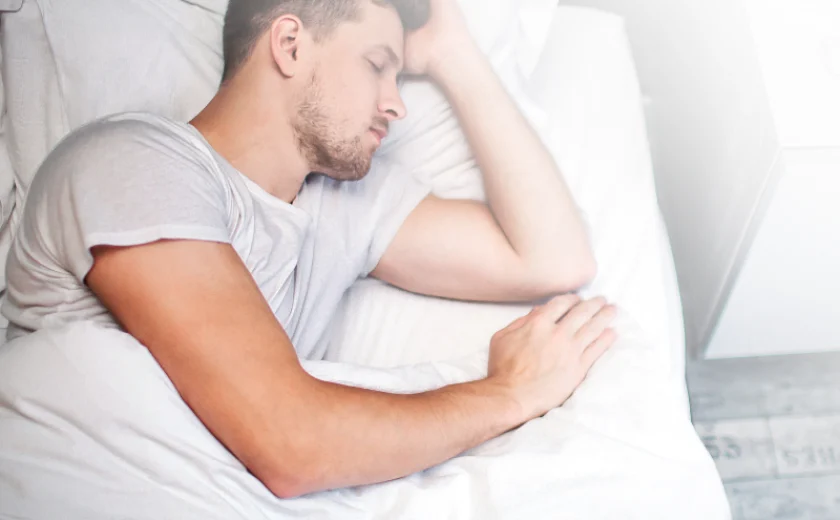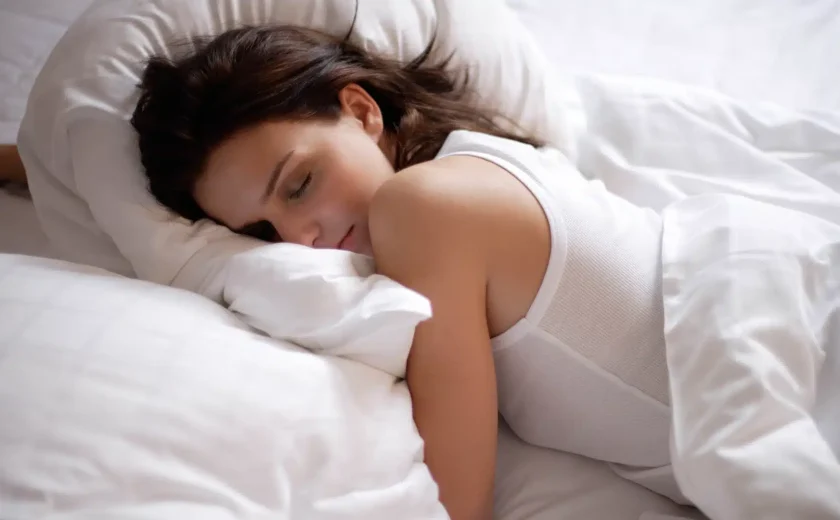Sleep apnoea is a common but serious sleep disorder that affects millions of people worldwide. It is characterized by frequent pauses in breathing during sleep, which can lead to poor sleep quality, fatigue, and an increased risk of several health complications, including cardiovascular disease, high blood pressure, and diabetes. Many factors can contribute to the development and worsening of sleep apnoea, and one of the most significant contributors is alcohol consumption.
Dr. Aditi Desai, President of the British Society of Dental Sleep Medicine (BSDSM), explains how alcohol and sleep apnoea are connected and why it’s crucial for individuals with sleep apnoea to be aware of the impact of alcohol consumption on their condition.
Sleep Apnoea
Before delving into the relationship between alcohol and sleep apnoea, it’s essential to understand what sleep apnoea is and how it affects the body. Sleep apnoea occurs when a person’s airway becomes partially or completely blocked during sleep, causing breathing to stop for a few seconds to minutes. These pauses in breathing can happen multiple times throughout the night, disrupting sleep and reducing the amount of oxygen that reaches the brain and other vital organs.
There are two main types of sleep apnoea:
- Obstructive Sleep Apnoea (OSA): The most common form, OSA occurs when the muscles in the throat relax excessively during sleep, causing a temporary blockage in the airway.
- Central Sleep Apnoea: This less common form occurs when the brain fails to send the correct signals to the muscles that control breathing.
Regardless of the type, sleep apnoea can have significant effects on overall health, and individuals with the condition often experience daytime sleepiness, difficulty concentrating, and a higher risk of accidents.
The Impact of Alcohol on Sleep Apnoea
Now that we have a basic understanding of sleep apnoea, let’s explore how alcohol and sleep apnoea are connected. Many people who struggle with sleep apnoea may not realize that alcohol can significantly worsen their condition. This is because alcohol has a relaxing effect on the muscles of the body, including those in the throat and airway.
Alcohol and Sleep Apnoea: A Dangerous Combination
Alcohol and sleep apnoea don’t mix well. Drinking alcohol can exacerbate the symptoms of sleep apnoea and increase the frequency and severity of apnoeic events (pauses in breathing during sleep). When you consume alcohol, your muscles relax, including the muscles in your throat. This relaxation can cause the airway to become even more obstructed, leading to more frequent breathing interruptions during the night.
Sleep apnoea and alcohol consumption create a vicious cycle: alcohol worsens sleep apnoea symptoms, which, in turn, results in poorer sleep quality, increased fatigue, and a greater risk of developing serious health problems. Therefore, it’s essential for individuals with sleep apnoea to understand how drinking alcohol can negatively affect their condition and take steps to limit or eliminate alcohol consumption.
Sleep Apnoea and Alcohol Use: The Dangers of Excessive Drinking
When it comes to sleep apnoea and alcohol, the key concern is excessive drinking. A few drinks may cause mild effects on the airway, but heavy alcohol consumption can lead to significant breathing disruptions. Those who suffer from sleep apnoea and drink alcohol in excess are at an even higher risk of experiencing more severe symptoms, including longer and more frequent apnoeic events, which can make sleep apnoea even more challenging to manage.
Research has shown that people with moderate to severe sleep apnoea who drink alcohol before bed experience a greater reduction in their oxygen levels during sleep. This reduction in oxygen saturation can lead to a number of complications, such as:
- Heart problems: A lack of oxygen during sleep can put undue stress on the heart, increasing the risk of heart attacks, strokes, and other cardiovascular conditions.
- High blood pressure: Chronic low oxygen levels can cause the blood vessels to constrict, leading to high blood pressure, which is commonly seen in individuals with sleep apnoea.
- Daytime sleepiness and fatigue: Alcohol consumption disrupts the quality of sleep, leading to increased daytime sleepiness and difficulty staying alert during the day.
Sleep Apnoea and Alcohol and Death: A Serious Risk
One of the most concerning aspects of the relationship between alcohol and sleep apnoea is the potential for increased risk of death. Sleep apnoea, especially when left untreated, can lead to severe complications such as heart failure, arrhythmias, and even sudden death due to respiratory failure. Alcohol exacerbates these risks by increasing the frequency and severity of apnoeic events, leading to prolonged periods of low oxygen levels.
There have been cases where individuals with severe sleep apnoea and alcohol use have experienced fatal outcomes due to the combined effects of these two factors. It is believed that alcohol not only worsens the airway obstruction caused by sleep apnoea but also reduces the brain’s ability to respond to low oxygen levels, making it even harder for the body to regulate breathing during sleep.
Sleep Apnoea and Alcohol Consumption: The Impact on Treatment
For individuals undergoing treatment for sleep apnoea, alcohol consumption can also interfere with the effectiveness of their treatment. Many people with sleep apnoea use Mandibular Advancement Devices (MADs) therapy. MADs are custom-fitted to the individual’s mouth and are designed to gently advance the lower jaw to maintain an open airway. This repositioning reduces the chances of airway collapse during sleep, which is the primary cause of apnoeic events in obstructive sleep apnoea. By keeping the airway open, MADs help improve oxygen flow and reduce snoring and other symptoms of sleep apnoea.
Mandibular Advancement Devices are an effective, convenient, and resilient treatment option for managing sleep apnoea. For individuals who consume alcohol, MADs provide a practical solution to help maintain an open airway during sleep, even when alcohol causes the muscles of the throat to relax. While alcohol can still impact overall sleep quality, MADs continue to help reduce apnoeic events and improve breathing during sleep.
For those who struggle with sleep apnoea and alcohol consumption, MADs offer a reliable and comfortable treatment option that can help maintain healthy sleep patterns and improve overall quality of life. It is always important to work with a healthcare provider to ensure that the right treatment plan is tailored to your specific needs, taking both sleep apnoea severity and lifestyle factors like alcohol consumption into account.

The Connection Between Alcohol and Sleep Apnoea: What You Should Do
If you have sleep apnoea and are concerned about how alcohol affects your condition, there are several steps you can take to protect your health:
Limit or Eliminate Alcohol Consumption
The most effective way to prevent the negative effects of alcohol on sleep apnoea is to limit or eliminate alcohol consumption altogether. If you do choose to drink, it’s essential to do so in moderation and avoid alcohol close to bedtime, as this is when alcohol has the most significant impact on your airway.
Monitor Your Sleep Apnoea Symptoms
If you continue to drink alcohol while managing sleep apnoea, it’s important to monitor your symptoms closely. Pay attention to whether your sleep quality worsens or if you experience more frequent apnoeic events. If you notice any changes, it may be time to reassess your alcohol consumption and consult your doctor.
Consult with a Sleep Specialist
If you have sleep apnoea and are concerned about alcohol and sleep apnoea interactions, it’s important to discuss your concerns with a sleep specialist. A sleep specialist can help you manage your condition more effectively and provide guidance on how to make lifestyle changes, including adjusting your alcohol consumption.
Maintain a Healthy Lifestyle
In addition to reducing alcohol consumption, it’s essential to maintain a healthy lifestyle to help manage sleep apnoea. This includes staying physically active, maintaining a healthy weight, and following a consistent sleep schedule. By making these changes, you can improve your sleep quality and reduce the severity of sleep apnoea symptoms.
In conclusion, the relationship between alcohol and sleep apnoea is a complex one. While alcohol may seem like a harmless way to unwind, it can have serious consequences for individuals with sleep apnoea. Alcohol consumption can exacerbate the symptoms of sleep apnoea, increase the risk of complications, and interfere with treatment effectiveness.
If you have sleep apnoea, it’s crucial to be mindful of how alcohol affects your condition. By limiting or eliminating alcohol consumption and working closely with your healthcare provider, you can take steps to better manage your sleep apnoea and improve your overall health.
Dr. Aditi Desai, with her expertise in sleep medicine, encourages individuals with sleep apnoea to understand the link between sleep apnoea and alcohol use and make informed decisions to prioritize their health and well-being.



